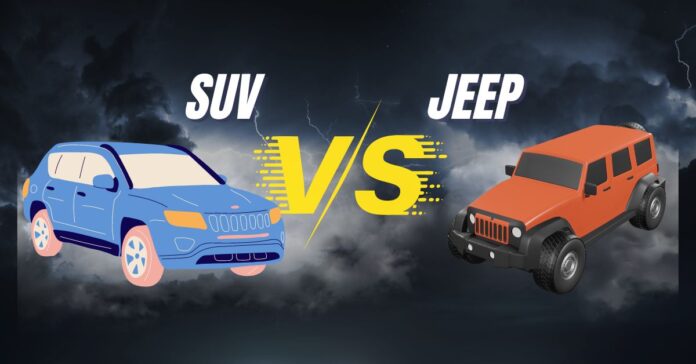When it comes to off-road adventures and outdoor explorations, choosing the right vehicle is essential. Two popular options that often come to mind are Jeeps and SUVs. Both offer versatility, capability, and ruggedness, but they have distinct characteristics that set them apart. In this comprehensive guide, we will delve into the comparison of Jeep vs SUV, exploring their features, performance, and considerations to help you make an informed decision when selecting your ideal vehicle for your outdoor pursuits.
Jeep: The Iconic Off-Roader:
Jeeps are renowned for their legendary off-road capabilities and iconic design. With their robust construction, high ground clearance, and specialized four-wheel drive systems, Jeeps excel in tackling challenging terrains, including rocky trails, mud, and steep inclines. Their short wheelbases and exceptional maneuverability make them ideal for tight spaces and off-road adventures.
SUV: Versatility and Comfort:
SUVs, or Sport Utility Vehicles, are known for their versatility, spaciousness, and on-road comfort. They offer a balance between ruggedness and everyday practicality. SUVs typically provide ample passenger and cargo space, making them suitable for family trips and long journeys. While not as specialized for extreme off-roading as Jeeps, many SUVs come with all-wheel drive or four-wheel drive options, providing decent off-road capability for most outdoor activities.
Off-Road Capability:
When it comes to off-road capabilities, Jeeps have a distinct advantage. They are purpose-built for tackling rough terrains and challenging trails. Jeeps often feature specialized four-wheel drive systems, locking differentials, and additional off-road features like skid plates and high approach angles. These capabilities make Jeeps the go-to choice for serious off-road enthusiasts.
On-Road Comfort and Handling:
While Jeeps shine in off-road performance, SUVs generally offer superior on-road comfort and handling. SUVs are designed to provide a smooth and comfortable ride on paved roads, making them suitable for everyday commuting and long highway drives. They often come with advanced suspension systems, refined interiors, and a range of amenities to enhance passenger comfort.
Fuel Efficiency:
When comparing fuel efficiency, SUVs tend to have the advantage. Modern SUVs have made significant strides in improving fuel economy, thanks to advancements in engine technology, aerodynamics, and lightweight materials. Jeeps, on the other hand, with their off-road capabilities and rugged construction, tend to have slightly lower fuel efficiency due to their specialized features and higher weight.
Style and Design:
Jeeps are instantly recognizable for their iconic design and rugged aesthetics. They exude a sense of adventure and embody the spirit of exploration. SUVs, on the other hand, come in various styles and designs, ranging from sleek and luxurious to more rugged and sporty. The choice of style and design ultimately comes down to personal preference and the image you want to portray.
Conclusion:
In the Jeep vs SUV debate, both vehicles offer unique advantages depending on your specific needs and preferences. Jeeps excel in off-road capabilities, maneuverability, and iconic style, while SUVs provide versatility, on-road comfort, and spaciousness. Consider factors such as off-road requirements, daily commuting, passenger, and cargo space, and personal style to determine the best fit for your outdoor adventures. Whether you choose a Jeep or an SUV, both vehicles offer the freedom and flexibility to embrace the great outdoors and embark on memorable journeys.


